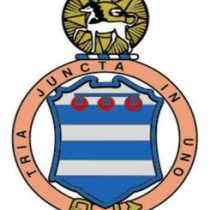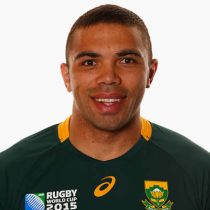Class act Kolisi set to bring home township to Springbok standstill
- 4271

Thursday lunchtime was quiet at the Ekupholeni Cocktail Lounge. The clearing up after Wednesday's Ladies' Night was out of the way. Another busy weekend lay ahead.
The Sunday Soul Session - tickets 70 Rand in advance, R80 on the door, R100 with VIP privileges - was looking like selling out. And on Saturday, just like every Saturday, the venue that first flung open its doors three years ago was guaranteed to be heaving.
"Saturdays are always busy," says Tumla Hani, who works at the bar.
The Ekupholeni sits on Skefile Street in Zwide, a largely down-at-heel black township that sits just north of Port Elizabeth.
This is the district where Siya Kolisi grew up in poverty.
Kolisi is now the captain of South Africa's mighty Springboks.
Their first black captain.
Twenty or so years ago he was an impoverished boy, living with his grandmother, and his favourite toy was a brick. Kolisi's vivid imagination meant he got by.
On Saturday he will lead out the Boks in the Rugby World Cup final in Yokohama, Japan, and win his 50th cap. It will be standing room only in the morning at the Ekupholeni.
A favourite son of Zwide
A five-minute brisk walk from the Ekupholeni, past rows of rudimentary single-storey homes, sits Emsengeni Primary School, where Kolisi began his formal education. The Dan Qeqe Stadium, where Kolisi launched his rugby life with the African Bombers under-nines, is a similar trot away in the opposite direction. Qeqe, who died in 2005, campaigned passionately during the apartheid era for non-racial sport.
The Lifa & Mafa Butchery, said to be a favourite 'braai' hangout of Kolisi, is in the same neighbourhood. The Zwide Stadium, where a hastily-hired big screen will show Kolisi as the Boks take on England, is not far away.
Kolisi sought out a local tavern to watch the Boks beat England in the 2007 final, he revealed this week, because there was no television at home.
The Ekupholeni might be welcoming in future Bok leaders on Saturday, but in all probability the crowd will be a recognisable older set, eschewing the outdoor screening to share familiar company.
"We're showing the game on our TVs," says Tumla Hani. "The people come to watch the game. There will be lots here. It will be full here. We're always full here on Saturdays anyway, and it will be special."
She expects the atmosphere to be joyous, as it was when South Africa took down Wales in the semi-finals.
Drinks flowed, and even after emotions had been scrambled by the late drama of that match, there was dancing and delirium.
"The singing as well - did you see that?" Tumla asks.
I did, thanks to a Facebook video, which is why I'm calling. The singing was born of pure joy. An impromptu, refreshed South African choir belting out grand hosannas routinely beats the typical English pub trudge through Swing Low, Sweet Chariot.
Arriving at a time of change
Kolisi was born on June 16 1991, a day before the apartheid era was officially repealed, and 16 months after Nelson Mandela was freed from Victor Verster Prison in Cape Town after 27 years of incarceration.
Books have been written, and films might follow, about Kolisi's rags-to-riches story.
He tells a story of turning up to Eastern Province junior rugby trials in "silk boxers, because I didn't have shorts". The boy in the strange garb caught the eye, inevitably, and he was soon offered a scholarship to the prestigious Grey High School in Port Elizabeth, which includes the great cricketer Graeme Pollock and former England rugby star Mike Catt among its alumni.
Kolisi, who together with over 90% of Zwide's population has Xhosa as a first language, needed to learn English. On the pitch, his rugby would do the talking, but to fit in at Grey - which he now describes as "the English school" - Kolisi had to buckle down and study.
He has gone from having no command to being one of the most eloquent and erudite English speakers in sport.
Kolisi's mother, who gave birth to him at the age of 16, died when he was still a Grey student.
But by then the boy was growing into a warrior of a man, and despite his grief, Kolisi's rugby potential was being fulfilled. He went to Western Province, played for the Baby Boks and eventually graduated to the Stormers.
Born to lead his country
A day before turning 22, Kolisi made his Springboks debut against Scotland. At the age of 25 he was made captain of the Stormers, and a year later the same status was bestowed upon him with the national team.
He is married now, to Rachel, with two children, lives as a devout Christian, and enjoys a lifestyle that bears scant comparison to his childhood years.
Bryan Habana, the now-retired wing superstar, has said a Kolisi-led Springboks winning the World Cup might surpass South Africa's 1995 triumph, when President Mandela presented Francois Pienaar with the Webb Ellis Cup.
What a moment in Springbok Rugby
— Springboks (@Springboks) October 31, 2019
🇿🇦🏴#StrongerTogether pic.twitter.com/LRfvaOFNGk
Success frequently breeds success, and Kolisi dreams of the day when youngsters from Zwide do not need to leave, as he did, to achieve their potential.
"It'd be so awesome... It's something I think will happen one day," Kolisi said.
His father, Fezakele, is making his first overseas trip to take in the final at first hand.
View this post on InstagramMy dads are on their way 🇯🇵 Utata's first overseas trip - what a time to be alive 🙏🏼
In Zwide, whether enjoying the warm atmosphere of the Ekupholeni or the outdoor big-screen community party, it matters to the townspeople that the Springboks get the job done on Saturday.
But what matters most for now is that Kolisi, the talisman of the team in green and gold, is proudly one of their own.















